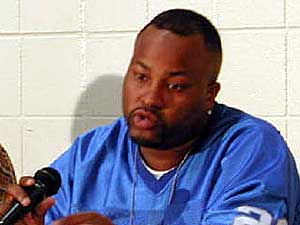|
Photos
More from MPR
Your Voice
|
Community weighs police brutality allegations
October 23, 2003
 |
| Stephen Porter claims that two police officers sexually assaulted him while they were searching him for drugs. (file photo) |
Minneapolis, Minn. — A television in the corner of Eddie's Barbershop loudly broadcasts ESPN. The sports highlight program prompts discussions about Vikings star Randy Moss' big play in last weeks game and the Kobe Bryant trial. However, it doesn't take much to get barber Eddie Withers to shift the conversation to the sexual assault allegations.
"Were talking about that fellow that got that thing stuck up his butt," Withers says to a customer. "(A reporter) want to know if that kind of thing goes on all the time - I say I imagine it do - I think we probably don't catch it all the time," he says.
 | |||
Withers has been in business for 33 years in South Minneapolis. This morning, all his clientele are African American men. Some sit in his chair for hair cuts. Others just come in for the conversation. Richard Mays is a retiree who makes a stop at the barbershop part of his daily routine.
"Cops are worth absolutely nothing," says Mays. "They're as useless as tits on a boar - the majority of them. Racist. Arrogant. Powerhungry."
Mays is a long time resident of Minneapolis whose opinions of police officers are built upon a lifetime of observations and experiences. He says the biggest problem with police officers in Minneapolis is that most of them don't live in the city and can't tell the criminals from law abiding citizens. Mays says that's evident in the numbers of black people who get pulled over by police like some guys he knows who had an air freshner hanging from their rear view mirror.
"Why did they stop them?" Mays asks other barbershop patrons. "'Well, we can stop you, you're not supposed to have those Christmas trees hanging up there. Yeah, they can stop you. And they did."
Studies support assertions made by Mays and other African Americans who charge that police are unfairly targeting black people.
Traffic stop data compiled by the Minneapolis Police Department shows that African American drivers are more likely to be stopped and searched by police officers. A study by the African American Men's Project found that in Hennepin County, nearly half of all Black men aged 18 to 30 are arrested each year. The disparity in incarceration rates between black men and white men in Minnesota is the largest in the country.
 | |||
But some people accuse the police of doing more than singling out African Americans for harassment and incarceration. Michelle Gross and members of Communities United Against Police Brutality staged a rally Wednesday night outside the Fourth Precinct in north Minneapolis.
"Christopher Burns - killed six minutes after police arrived in his home in South Minneapolis - Christopher Burns we remember you!" shouts Gross into a bullhorn.
Christopher Burns died last year. Minneapolis police were called to his house on a domestic disturbance call. Hennepin County Medical Examiners ruled that Burns died from pressure on his neck while officers attempted to restrain him. However, the medical examiner noted that Burns had a history of high blood pressure with advanced coronary artery disease. Officers who restrained Burns were cleared of wrongdoing by a Hennepin County grand jury.
There have been nine cases of police related fatalities in Hennepin County that have resulted in a grand jury investigation since 2000. All of those cases have resulted in the clearing of the police officers.
 | |||
Lois Howard and her two kids are having coffee and smoothies at the Bean Scene coffee shop in North Minneapolis. Howard says she thinks police officers are sometimes too quick to judge or stereotype African Americans they encounter on the street. However, she says there's another side to that.
"And I think we as a people could be a little more calmer about things," says Howard.
Howard says African Americans should not give police officers a good reason to use excessive force. She says when situations get tense, cops get scared and call in more cops, which she says can make things worse. Howard says she worries that her children might get caught up in situations like this. She has given instructions to her 16-year-old son on how to behave around police officers.
"If you ever get stopped - cause he's driving now - and I always tell him - 'let them talk'," she says. "Don't even be quick to ask them, why did you stop me? Just let them get it out. And ask in a very polite way, 'can I ask you why did you stop me?'"
Howard also limits her daughter's activities. Her daughter Rita is 14. Rita is already forming an impression of how police treat black people. She says when she's allowed to go to North High or Henry High School basketball games, police are often rude to the students who attend.
"And the police are quick to tell us to shut up or to pull out their mace or something and tell us, 'Well you better just sit down. So, since he has that badge he thinks he can just talk to us that way. He or she."
The Howard family lives in a part of north Minneapolis where crime and police presence are heavy. However, Lois Howard says she is sometimes reluctant to call police because she fears her call could lead to an unnecessary confrontation between officers and the young men who sometimes hang out on the street corner.
Minneapolis police officials say they are working on improving relations with communities of color through the mediation process and other neighborhood collaborations. And they say complaints against officers have been on the decline. Meanwhile more demonstrations and marches against police brutality will be held in the next week.
|
News Headlines
|
Related Subjects
|
